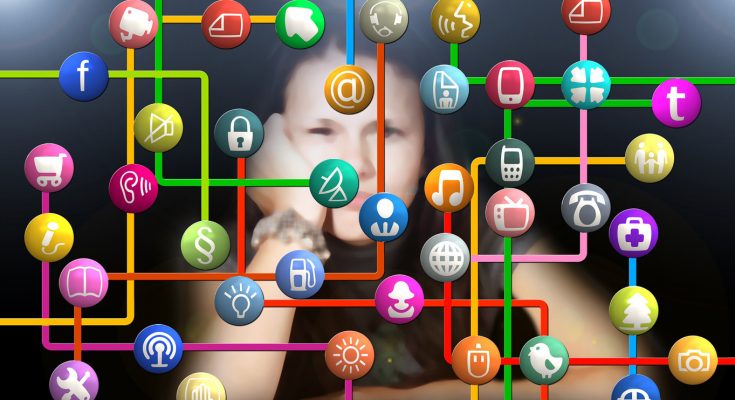Scroll, tap, post, like, share, repeat. Social Media has become a ubiquitous part of our lives, a digital playground where we connect, create and consume with dizzying speed and ease. From humble beginnings as a way to stay in touch with friends and family, Social Media has grown into a global behemoth, with billions of users and trillions of interactions. But with great power comes great responsibility and Social Media’s impact on our lives is far from simple or benign. In this essay, we will explore the thrilling highs and chilling lows of Social Media, examining its potential to inspire, inform and empower, as well as its risks of manipulation, addiction and harm. So fasten your seatbelt and get ready for a wild ride through the world of Social Media.
Advantages of Social Media
Communication
Got something to say? With Social Media, you can share it with the world in seconds. From breaking news to personal updates, Social Media platforms have transformed the way we communicate and connect with others. Whether you want to stay in touch with friends and family, network with professionals, or collaborate on projects, Social Media offers a wealth of opportunities for communication, information exchange and collaboration.
With Social Media, you can connect with people from all over the world, expanding your horizons and breaking down barriers. You can share your ideas, perspectives and experiences with others and learn from theirs in turn. And with the rise of video and live-streaming, Social Media has become an even more dynamic and immersive platform for communication and storytelling.
Social Media platforms such as Facebook, Twitter and WhatsApp have become powerful tools for facilitating communication and information exchange, allowing us to stay up-to-date with the latest news, trends and events in real-time.
Social Media also offers a wide range of opportunities for networking and collaboration. From LinkedIn to Meetup, Social Media platforms have created virtual spaces where professionals and enthusiasts can connect, exchange ideas and collaborate on projects. Social Media can also be a powerful tool for finding employment, as employers increasingly use Social Media to find and vet job candidates.
Education and Learning
Social Media has the potential to be a powerful tool for education and learning. With the rise of online learning platforms and educational resources, Social Media has made it easier than ever to access a wealth of information and knowledge from anywhere in the world.
Social Media platforms such as YouTube, Khan Academy and Coursera offer free or low-cost online courses and tutorials on a wide range of subjects, from computer science to history, that can help learners of all ages and backgrounds to improve their skills and knowledge. Social Media also offers opportunities for informal learning and self-education, allowing individuals to explore their interests and passions at their own pace and on their own terms.
In addition to providing access to educational resources, Social Media can also encourage digital literacy and media skills. With the vast amount of information available on Social Media, it’s important for individuals to be able to navigate and evaluate sources critically and to develop skills in digital communication and collaboration. Social Media can also provide a platform for creative expression and experimentation, allowing individuals to develop their digital skills and explore new forms of media and communication.
Business and Marketing
In 2022, marketers spent $65.31 billion on Social Media advertising
Social Media has transformed the world of business and marketing. With billions of users on platforms like Facebook, Instagram and Twitter, Social Media offers an unprecedented opportunity for businesses to promote their products and services, build their brand and engage with their customers.
Through Social Media, businesses can showcase their products and services in creative and visually appealing ways, reaching a wider audience than ever before. By leveraging the power of Social Media influencers and user-generated content, businesses can build a loyal following and establish themselves as trusted and reputable brands.
Social Media also offers targeted advertising and audience segmentation, allowing businesses to reach specific audiences based on factors such as age, location, interests and behaviours. This not only helps businesses to reach the right people with their message, but also enables them to track and measure the effectiveness of their advertising efforts in real time.
In addition to these benefits, Social Media can also provide valuable insights into customer behaviour and preferences, allowing businesses to tailor their products and services to meet the needs of their audience. Through Social Media analytics and data tracking, businesses can gather information on customer demographics, interests and engagement and use this information to refine their marketing strategies and improve their customer experience.
Entertainment and Leisure
Social Media has revolutionised the world of entertainment and leisure, offering a seemingly endless array of music, videos and games at our fingertips. Platforms like YouTube, TikTok and Instagram provide a wealth of content for users to explore and enjoy, from viral dance challenges to original music and comedy skits.
Social Media also offers opportunities for the creation and sharing of content, allowing users to express their creativity and showcase their talents to a global audience. With easy-to-use tools for video editing and music production, anyone can become a content creator and build their own online following.
In addition to providing entertainment, Social Media can also expose users to diverse cultures and perspectives from around the world. Through Social Media, users can connect with people from different backgrounds and learn about different cultures, languages and customs. This can broaden our horizons and help us to become more informed and empathetic global citizens.
Disadvantages of Social Media
Cyberbullying and Harassment
While Social Media offers many benefits, it also has a dark side. Cyberbullying and harassment are rampant on Social Media platforms, with users using the anonymity and distance provided by the internet to target others with hurtful and abusive messages.
The effects of cyberbullying and harassment can be devastating, leading to depression, anxiety and even suicide in some cases. Social Media can also contribute to feelings of isolation and loneliness, as users compare themselves to the seemingly perfect lives presented by others online.
In addition to the negative effects on mental health and well-being, cyberbullying and harassment can also have legal and ethical implications. In many cases, the use of Social Media for bullying and harassment is illegal and can result in serious consequences for the perpetrator.
It’s important for Social Media users to be aware of the risks of cyberbullying and harassment and to take steps to protect themselves and others online. This includes reporting abusive behaviour to platform administrators, supporting those who are being targeted and practising empathy and kindness in all online interactions. Ultimately, Social Media has the power to connect us and bring us together, but it’s up to us to use it responsibly and ethically.
Privacy and Security
One of the biggest concerns surrounding Social Media is the risk of privacy and security breaches. Users are often required to provide personal information when signing up for Social Media accounts, such as their full name, email address and birthdate. This information can be used by hackers and scammers to commit identity theft, fraud and other types of cybercrime.
In addition to the risk of identity theft and fraud, Social Media platforms also pose a risk of exposing personal information and data. Many platforms collect and store large amounts of data about their users like their browsing history, search queries and location data. This information can be used by advertisers to target users with personalized ads, but it can also be vulnerable to security breaches and hacking attempts.
Regulating Social Media platforms can be a challenging task, as the platforms themselves are often global in nature and subject to different laws and regulations in different countries. This can make it difficult to enforce privacy and security measures and ensure that users are protected from harm.
It’s important for Social Media users to take steps to protect their privacy and security online, such as using strong passwords, enabling two-factor authentication and being cautious about sharing personal information online. Additionally, policymakers and platform administrators must work together to develop effective regulations and safeguards to protect users from the risks of Social Media.
Addiction and Time Management
Worldwide, people spend an average of 2 hours and 28 minutes per day on Social Media
The amount of time spent on social sites is astounding. One report indicates the average teen ages 13 to 18 spends about nine hours on Social Media each day; tweens ages 8 to 12 are on for about six hours a day.
One of the most significant disadvantages of Social Media is the potential for addiction and compulsive behaviour. Many users find themselves spending hours scrolling through their feeds, checking notifications and responding to messages, often at the expense of other important activities like work or school.
The use of Social Media as a distraction and time-waster can have negative effects on productivity and focus. Studies have shown that excessive Social Media use can lead to decreased academic and work performance, as well as increased stress and anxiety.
In addition to the negative impact on productivity and focus, Social Media addiction can have significant mental health implications. Studies have linked excessive Social Media use to increased feelings of depression, anxiety and loneliness.
It’s important for Social Media users to be mindful of their usage and to take steps to manage their time effectively. This may include setting limits on Social Media use, taking regular breaks from Social Media and finding alternative activities to engage in. It’s also important for policymakers and platform administrators to address the issue of Social Media addiction and promote healthy usage habits.
Misinformation and Polarisation
One of the biggest challenges posed by Social Media is the spread of misinformation, fake news and propaganda. Social Media platforms have been used to disseminate false or misleading information, often with the intent of influencing public opinion or political outcomes. The ease and speed of sharing information on Social Media can make it difficult to distinguish between credible sources and misinformation.
Furthermore, Social Media has been found to amplify biases and reinforce echo chambers, in which users are exposed only to information and opinions that align with their pre-existing beliefs. This can lead to polarisation and a lack of meaningful discourse between different groups with opposing views.
The spread of misinformation and polarisation can have significant negative effects on democratic processes and public discourse. It can undermine trust in institutions and erode the quality of public debate. In extreme cases, it can even contribute to social unrest and conflict.
It’s important for Social Media users to be critical of the information they encounter and to fact-check claims before sharing them. It’s also important for policymakers and platform administrators to address the issue of misinformation and polarisation by promoting media literacy and critical thinking skills and by taking measures to reduce the spread of false information on their platforms.
So, what have we learned today about Social Media? Well, it’s like a box of chocolates – you never know what you’re gonna get. You might find yourself connecting with old friends, learning new skills, or even getting a good laugh. But watch out for the sour ones, like cyberbullying, privacy invasion and addiction. It’s easy to get sucked into the Social Media vortex, but let’s not forget to come up for air and live in the real world too. With great power comes great responsibility and Social Media is no exception. So, let’s use it wisely, mindfully and always with a healthy dose of scepticism.




Thanks for giving great and informative knowledge about the advantages and disadvantages of social media.